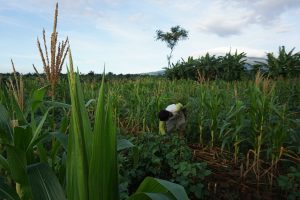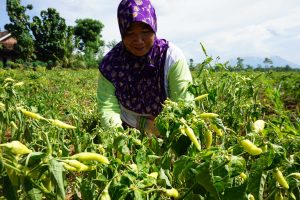Bongkoran farmers of Wongsorejo, Banyuwangi district of East Java, who have occupied lands under the Dutch colonialization in the 10402, found themselves still struggling to get their lands to be recognized by the state nearly five decades later. Tensions between farmers, a local cotton manufacturer and local government continue to mount amid efforts to revive the Agrarian Reform by the Joko Widodo administration. Read full article here.
By Ika Ningtyas
Banyuwangi, East Java. After almost fifty years of struggle to claim ownership of their land, Bongkoran farmers of Banyuwangi, East Java province see hope in the Agrarian Reform revived by the Joko Widodo’s administration. This program, once fully implemented, will allow them to reclaim their land from the company that has been aiming to turn the people’s agriculture area into industrial estate by the end of this year.
“We have submitted documents and maps of areas directly to the President to be prioritized in the Agrarian Reform program,” said Yateno Subandio, Head of Wongsorejo Banyuwangi Farmers Organization.
The farmers’ submission to the central government is a result of decades of frustration and disappointment as local government of Banyuwangi not only failed to recognize their land rights but also has done very little to resolve conflicts and criminalization of farmers.
The Agrarian Reform that governs land ownership and distribution for farmers and labors in agriculture sector was stipulated under the 1960 Law on Agrarian. But the Soeharto administration, in the New Order era, voided the law and replaced the regulation to give way to investments with 30 years of ownership.
One such investors, PT Wongsorejo, a local cotton producer, was granted the permits for 603 hectares of areas for kapok plantation in Wongsorejo, Banyuwangi. However, 231 out of the 603 hectares were occupied and managed by Bongkoran farmers since the 1930s and 1940s.
The farmers allocated 220 hectares for agriculture and 11 hectares for settlement.

The land dispute prompted several villagers to transmigrate to East Kalimantan while the rest have been fighting for their rights to the land until today.
In 2014, National Land Agency granted rights to build, or Hak Guna Bangunan (HGB), for 487 hectares to the company after its cultivation rights had expired in 2012, again, overlapping the 231 hectares of farmers areas.
Land conflicts have triggered physical altercations between farmers and the company. In2001, one farmer was shot and 4 were imprisoned between two to 20 days, without trial. While in 2014, a clash with the company’s security officers lead to the rest of three farmers and they were sentenced to 4 months and 15 days of jail time.
Meanwhile, Corporate Communication of PT Wongsorejo, Tria Utama, claimed the company had obtained all necessary permits to develop industrial estate in accordance to government regulation.
“We have HGB (right to build) which is protected by the law, our documents are complete,” said Utama adding that Bongkoran farmers have, instead, been illegally occupying the company’s areas since 2000.
“They were trespassing our lands and could not present land certifications. There’s no proof of their claim to owning the land,” he said..
Utama also noted that the company will start developing the industrial estate by the end of 2018 or early 2019, which is expected to open up at least 70,000 jobs with the priority to employ local people.
“Of course, we will prioritize Wongsorejo before recruiting from other districts,” said Utama adding that the job opportunities for Bongkoran farmers to work in industrial estate is a way to solve the on-going conflict.
The solution, he said, was in accordance to regional regulation declaring the conflict areas as industrial estate instead of agriculture areas forcing local people to shift livelihood from farmers to becoming industrial workers.
Based on Regional Regulation on 2012 – 2032 Banyuwangi Spatial Planning Plan, Wongsorejo subdistrict will serve as industrial estate that comprises of metal industry, chemical industry, oil industry, machinary and equipment industry, timber, rubber and plastic industries, paper industry and food and beverage industries.
“Based on the regional regulation, Wongsorejo areas will be transformed into industrial estate. So, local people can start looking to building and owning their own business that cater to these industries,” he said. But farmers rejected the idea as they could earn an average of Rp4.8 million (US$ 339) per month during normal weather, while working for the company will only give them a Rp.1,8 million (US$127) monthly salary, under the Regional Minimum Wage regulation.
“We were only able to complete elementary school, what kind of work will we be doing in the estate? It would probably be cleaning service or low labor work. The pay will be small,” said Subandio, a representative of Bongkoran farmers.
Edi Purnomo of Banyuwangi Development Planning Agency, said that 2,000 hectares in Wongsorejo subdistrict, including PT Wongsorejo’s concession areas, had been declared as industrial estate under a regional regulation. Hence, the government agreed to grant rights to build to the company that was planning to establish industrial estate.
In regards to the land conflict between farmers and the company, Edi said that it was under the authority of PT Wongsorejo as the owner of the land, to settle.
Edi adds that Banyuwangi administration had acted as mediator between the two disputing parties through local head of subdistrict but no agreement has been reached.
Surviving in Conflicts
Crop failure is not what concerns Sriyati, one of Bongkoran farmers, as she decided to stay in her village and join hundreds of other farmers to claim the rights to the land that they have been living on for decades.
The 45 year old recalled a day in 2017 when she had to leave her work in the field after hearing the sound of kentongan, a small drum made of bamboo or wood which is struck to sound an alarm.
With hundreds of farmers, she stood on the ground trying to stop a bulldozer owned by the company, from entering their village to start building a security post. Farmers finally toppled this plan.

“There’s no peaceful farming here,” said Sriyati adding she’s always restless because of the looming eviction from the company.
But that did not stop Sriyati and 288 other farmers to continue working their 220 hectares of areas, divided three-quarter hectares for each family.
They plant intercropping crops and palawija (secondary crop they plant during the dry season), which are corn, cassava, chilly, ground nut, and green nut.
On normal weather, corn harvest can reach 1,728 tons, 864 tons for cassava, 432 tons for chilly, one ton for ground bean, and 576 quintals of green bean. Located in low rainfall areas, the farms rely a lot on rain water before they work on the land.
“I hope the rain will come,” said Sriyati who suffered corn crop failure last month.
Meanwhile, Fitriyani, who is seven months pregnant, has other concern; damaged roads. Their only access to a public health facility.
“Though [my husband] tried to go slow with the motorcycle and be very careful, I can still feel the bumps,” she said admitting that they would spend an hour traveling on the damaged road.
There are two roads leading to Bongkoran village however both of them are in poor condition as they have never been paved for 50 years, followed by heavy loading trucks coming in and going out of the plantation. The road gets muddy and slippery during rainy season.
Paijah, Head of Wongsorejo Banyuwangi Female Farmers, said that the damaged road puts pregnant women at risk of miscarriage.
“We have a case of miscarriage when the pregnant woman was trying to go to the public health facility,” said Paijah recalling cases where women gave birth on the road, inside the truck as they couldn’t reach the health facility in time.
Yateno Subandio of Wongsorejo Banyuwangi Farmers Organization said that the government hasn’t done anything to fix the road as it is deemd as the responsibility of the company, while farmers have no means to fix them.
“We don’t have that kind of funding,” he said.
Meanwhile, Ardian of Banyuwangi Development Planning agency, said that Banyuwangi administration has tried to release the lands of Bongkoran village in 2016 but failed as it was included in the rights to build, granted to the company.
“After that, there were no more discussions about the roads,” said Ardian.
Crop Security vs Land Inequality
Land conflicts in Bongkoran is not the only case in Indonesia. Agrarian Reform Consortium, an organization with concerns on agrarian reform movement recorded an increase of land conflicts in the past six years.
In 2017, there were 659 cases reported in various areas in Indonesia, — Java, Kalimantan, Sumatra and others –, which had affected 652,738 families, 612 people suffered violent abuses, 369 people were criminalized, 224 people were persecuted, were shot and 13 people dead, that prompted the Agrarian Reform Committee to declare 2017 as the agrarian emergency year.
Head of Human Rights Law Center from the Law Faculty of Airlangga University, Surabaya, Herlambang P. Wiratraman, said high record of agrarian conflict was in contrast with government’s goal to achieve food security.
“Food security does not make sense as agrarian conflicts and evictions of farmers from their own land are increasing,” said Wiratraman underlining cases against farmers that occurred in the country’s breadbasket such as Banyuwangi.
Wiratman adds that agrarian conflict was rooted in Indonesia because the agriculture structure was being controlled by corporation instead of farmers.
East Java plantation agency recorded 47,654.29 hectares that were granted to 40 companies — 27 private companies with a total of 17,502.49 hectares and 13 state company with 30,151.8 hectares.
Meanwhile, Statistics Indonesia stated that farmers without land ownerships amount to 160,708 families in Banyuwangi, in 2013. Those who own or rent lands only covers an average of a quarter hectares.
Wiratman notes that Agrarian Reform and Social Forestry run by current administration has yet to answer farmers’ issues in Indonesia as the program did not touch the issue of inequality of ownerships and agrarian structure.
Instead, the government granted new permits on investment for infrastructure, mining and industry which are threatening and controlling agriculture areas, for example the Banyuwangi case, he added.
He said that food security can be achieved with political will to take side with farmers, especially those being evicted from their lands and do not own any lands. Ekuatorial.
Ika Ningtyas is a freelance journalist and member of the Society of Indonesian Environmental Journalists (SIEJ) based in Banyuwangi, East Java.